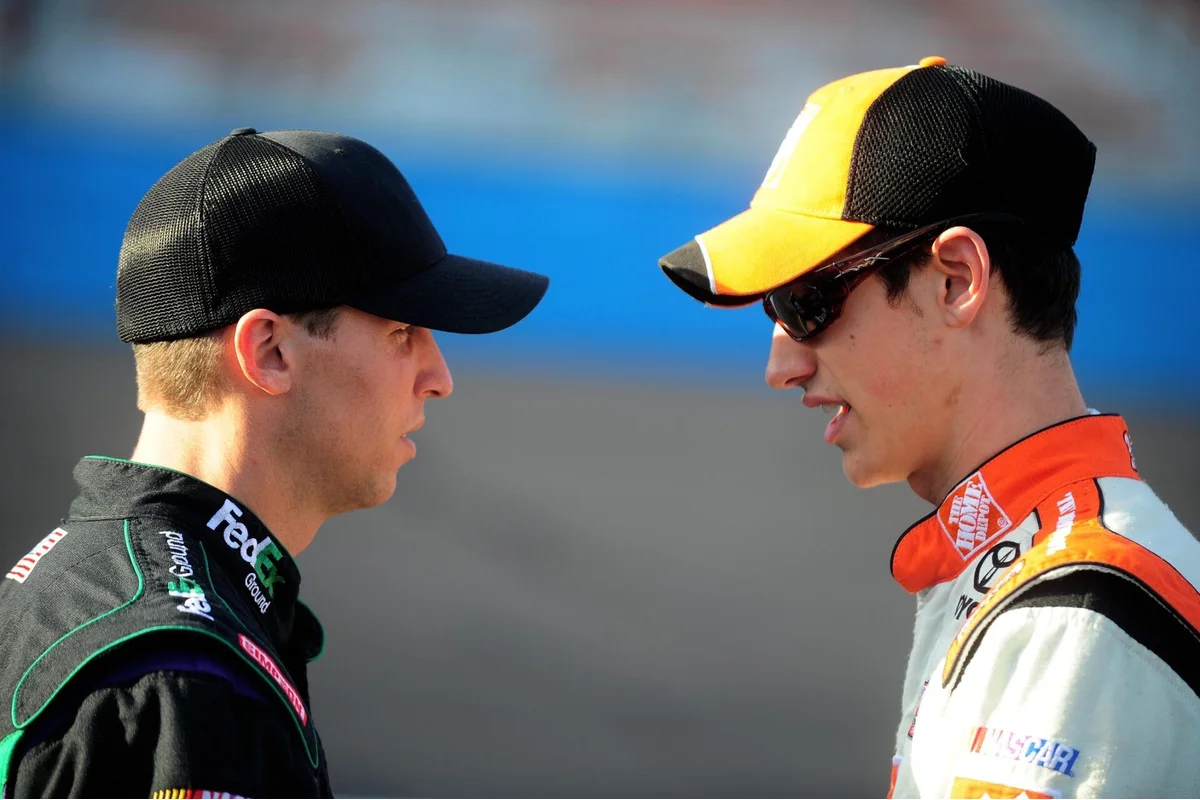A heated debate has reignited after a dramatic late-race incident at Senoia Raceway, with Denny Hamlin NASCAR controversy becoming the centerpiece of renewed scrutiny over how NASCAR handles emotional moments in racing. Chris Gabehart, Hamlin’s longtime crew chief, aligned himself with critics who believe the sport has stripped away its raw edge in favor of a more polished, penalty-driven image.
Controversial Move at Senoia Raceway Spotlights NASCAR’s Cultural Shift
The discussion was rekindled following a FloRacing Night in America event at Senoia Raceway, which ended in a crash and an emotional helmet toss on track. The incident, featuring Brandon Overton and points leader Bobby Pierce, quickly went viral and brought comparisons to Tony Stewart’s iconic 2012 helmet throw at Bristol, an expression of anger that once typified NASCAR’s appeal.
Motorsports.com’s Matt Weaver weighed in, referencing the Stewart moment and criticizing the governing body’s current approach:
“Shades of Bristol and Tony Stewart,” he wrote. “You know, while we’re having conversations about what NASCAR needs to do to regain its mainstream popularity — add the helmet toss to ass-kickings as things to allow without penalty once again.
“I just feel like NASCAR has made a series of decisions to sanitize its forward facing product in the name of professionalism — overlooking the reality that this is still a sport of sophisticated yokels driving in circles and into each other. Lean into that,” he added.
Chris Gabehart, serving as Denny Hamlin’s crew chief, signaled strong agreement by acknowledging Weaver’s statement with a simple upward-pointing emoji. This gesture underscored the sense that personalities and confrontations, once pillars of the sport’s popularity, are being stripped away.
NASCAR’s contemporary rulebook comes with severe penalties for behaviors that years ago defined the sport’s fierce competitive spirit. Even minor confrontations or heated expressions—including helmet tosses or inevitable pit road contact—often bring quick fines and sanctions. These increased penalties orbit alongside infractions logged as L1, L2, or L3 violations, making every visible act of emotion a potential cost, both financially and reputationally.
Changing Penalties Suppress NASCAR’s Authenticity
The atmosphere within the NASCAR garage has grown measured as a result, with drivers and personalities often quieting their genuine reactions. Sponsors further contribute to this restraint, seeking damage control and polished behavior over dramatic conflict. Not only are high-profile confrontations becoming less common, but this subdued style has also coincided with wavering fan interest and lower TV ratings. Old-school fans lament the absence of unscripted emotion they now find more reliably at local dirt tracks, like during Senoia’s high-stakes Peach State Classic finale.
The Peach State Classic itself was a showcase of unfiltered passion. During the event, Bobby Pierce, the season’s points leader, and Brandon Overton made contact as Overton attempted to pass. Overton’s car spun sideways into the wall, was swept up by several other cars, and he retaliated by throwing his helmet at Pierce as he drove by. In the end, Jonathan Davenport nearly took the championship, but Pierce secured it by three points by finishing sixth, claiming both the FloRacing Night in America crown and a $75,000 prize.
Insiders Call Out NASCAR for Double Standards in Discipline
This cultural shift and stricter discipline have not escaped attention. NASCAR has repeatedly fined drivers for conduct that it subsequently features in marketing campaigns. Jordan Bianchi of The Athletic voiced frustration on The Teardown podcast, highlighting the hypocrisy in punishing outbursts only to capitalize on them in league promotions. He pointed to last season’s altercation where Ricky Stenhouse Jr. punched Kyle Busch—a moment widely publicized despite resulting in a $75,000 fine:
“If Ricky Stenhouse Jr. is going to pop Kyle Busch, I’m not fining him $75,000. I’m probably going to pay him $75,000 for that and go, ‘Here’s your check. Thank you for that. You just got us on every national outlet in the country and we’re not going to embarrass you by fining you 75 grand, which by the way pisses off your sponsor, because your sponsors like, ‘Oh man, that makes us look bad.
“It’s so hypocritical to sit there and fine these guys this money and at the same time turn around and use it for commercials. You can’t have it both ways,” Jordan Bianchi said in The Teardown podcast.
This sentiment is shared by many within the racing community, including journalists such as Matt Weaver and team leaders like Chris Gabehart, who argue that NASCAR’s drive toward professionalism has suppressed the character and unpredictability that once attracted fans. The league’s dual approach—punishing drivers for authentic celebrations and then broadcasting those same moments—has left industry veterans and viewers questioning the current direction of the sport.
Hamlin’s Season Ends in Disappointment as Debate Over NASCAR’s Identity Rages
As the current stock-car season concluded, Denny Hamlin faced another devastating near-miss. During the 2025 Cup Series finale, Hamlin’s team opted for a four-tire pit stop, but Kyle Larson gambled on just two and ultimately won the title, amplifying the heartbreak for Hamlin and his supporters. The scene was emblematic of a season filled with both thrilling on-track moments and ongoing controversy about the sport’s sanitized approach.
With major figures in the sport like Hamlin and his crew chief voicing concern, the Denny Hamlin NASCAR controversy highlights an ongoing identity crisis for the league. Emotional moments, from helmet throws to pit road arguments, are entwined with NASCAR’s unique place in American motorsports. However, as penalties intensify and drivers are encouraged to hide their raw reactions, the future of that tradition remains uncertain. Fans and insiders alike are left wondering if the league can strike a balance between professionalism and authenticity, or if NASCAR will continue to drift further from its spirited roots.
"Shades of Bristol and Tony Stewart."
You know, while we're having conversations about what NASCAR needs to do to regain its mainstream popularity — add the helmet toss to ass-kickings as things to allow without penalty once again. https://t.co/PjG8lG2PIT
— Matt Weaver (@MattWeaverRA) November 16, 2025
👆
— Chris Gabehart (@CG1751) November 16, 2025
